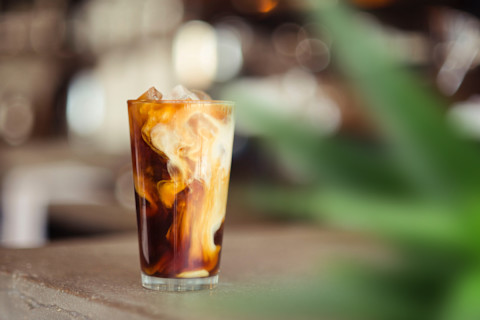
Coffee is crazy popular—a staggering 62 percent of us have reached for a cup of joe within the past day.
One particularly popular way to get your java is cold brew. The beloved drink of coffee snobs everywhere has gone mainstream. Cold-brew sales have grown 115 percent in just one year's time, and it's showing no sign of stopping. Millennials, in particular, are the most fond of cold brew, with 66 percent of American millennials drinking the cold stuff, compared to 34 percent of generation X.
Cold brew is not the same as iced coffee, which is just regular coffee poured over ice, naturally. No, there is an art and a science here. Cold brew is made when coffee beans are steeped in cold or room-temperature water for 12 to 24 hours. Like a big tea bag, only with coffee.
Some cold-brew lovers brag that their magical caffeinated elixir not only tastes better than the regular hot stuff, but it's healthier, too. So, what's the deal? Let's cut through the coffee confusion.
Caffeine.
For those of you who want to limit the jitters or want more to boost your workout, should you go for cold brew or not? Cold brew's coffee-to-water ratio is around 1:6, compared with the drip-coffee ratio of about 1:20. Dang, that's a lot of caffeine.
However, cold-brew coffee concentrate is also typically diluted with water or cream, which brings the caffeine back down. The problem with comparing caffeine levels between different types of coffee is the variability of several factors. The beans that you use, how much you use, how long you steep your cold brew, and how much is diluted with water or cream are all variables that determine caffeine concentration.
Although caffeine content will vary from glass to glass, a 16-ounce Starbucks cold brew contains roughly 200 mg of caffeine while a hot 16-ounce coffee contains anywhere from 260 to 375 mg, depending on the beans. Clover and blonde roasts tend towards the higher range and dark roasts tend to be on the lower range, relatively speaking.
The verdict? Cold brew tends to have slightly less caffeine than drip coffee.

Acidity.
Heat is not used when making cold-brew coffee, so there tends to be less of the strong, sometimes bitter taste found with drip coffee. The acids found in coffee grounds are predominantly extracted at higher temperatures, giving cold brew a relatively smoother, less acidic taste. Because of this, people with more sensitive stomachs or acid reflux tend to tolerate cold brew better.
Nutrients.
There is a lot of exciting research on the health benefits of drinking coffee, such as increasing insulin sensitivity, fat burning, decreasing dementia and neurodegeneration and overall living a longer life. Most of this research is centered around coffee's inflammation-busting antioxidant content. Coffee compounds like chlorogenic acid are the star players at fighting disease.
Because cold brew is relatively new to the mainstream barista scene and even newer to researchers, there isn't really any solid evidence that shows cold brew has lower or higher levels of these antioxidants. Although more research needs to be done, it's possible that because more coffee acid and oils are left behind during the cold brewing process, there may be fewer antioxidants, but the amount is probably negligible.
Whether you love your cold brew or want to stick with drip, opt for organic beans because pesticides are often used on coffee crops.
The verdict?
As a functional medicine practitioner, I see some people who tolerate coffee and some who don't. Some people have gene variants that code for the enzyme CYP1A2, which causes them to metabolize caffeine more slowly. Even a small cup of cold coffee will leave them feeling jittery and with a racing heart.
Even though cold brew tends to have caffeine, it's not enough for people who don't tolerate caffeine well.
For people who tolerate caffeine and want the longevity benefits of coffee, if you're looking for something gentler on your stomach with slightly less caffeine, cold brew is your cup of joe. If you're looking for a ton of nutrients otherwise not found in regular coffee? Well, you'll have to look elsewhere.
We covered the coffee—but what about the milk? We settle the debate about whether dairy is actually good for you, once and for all.

Will Cole, IFMCP, DNM, D.C., is a leading functional medicine expert who consults people around the globe, starting one of the first functional medicine telehealth centers in the world. Named one of the top 50 functional and integrative doctors in the nation, Dr. Will Cole provides a functional medicine approach for thyroid issues, autoimmune conditions, hormonal imbalances, digestive disorders, and brain problems. He is the host of the popular The Art Of Being Well podcast and the New York Times bestselling author of Intuitive Fasting, Ketotarian,The Inflammation Spectrum, and Gut Feelings.

Will Cole, IFMCP, DNM, D.C., is a leading functional medicine expert who consults people around the globe, starting one of the first functional medicine telehealth centers in the world. Named one of the top 50 functional and integrative doctors in the nation, Dr. Will Cole provides a functional medicine approach for thyroid issues, autoimmune conditions, hormonal imbalances, digestive disorders, and brain problems. He is the host of the popular The Art Of Being Well podcast and the New York Times bestselling author of Intuitive Fasting, Ketotarian,The Inflammation Spectrum, and Gut Feelings.
